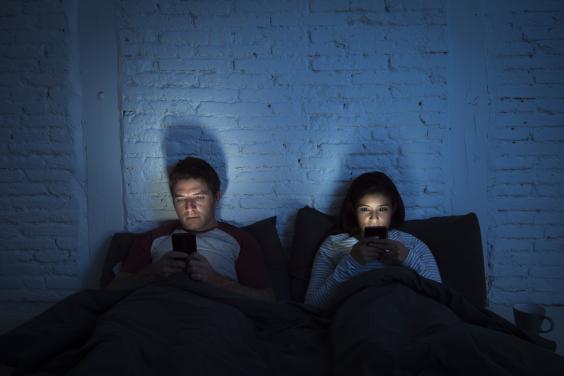14 of the biggest myths about sleep, debunked - Part 2
While we know far more about sleep now than we used to, there are a
huge number of myths about sleep that persist. Many of these stem from
not understanding the full importance of sleep; other myths have been
created by people trying to sell products to improve nightly rest.
These are some of the most prominent myths — and the facts. (Continued from previous edition)
8. Myth: You swallow a few spiders every year while asleep.
Eight spiders crawl into your open mouth every year and there's nothing you can do about it, according to the legend.
Fortunately for the arachnaphobics around us, it's extremely unlikely. We make noise and vibrate in our sleep, and thats likely to scare off spiders.
The debunkers over at Snopes traced the claim to a list of "facts" designed to show how gullible people might be.
9. Myth: Insomnia just means you can't fall asleep.
Difficulty falling asleep is one type of insomnia, according to the National Sleep Foundation, but it's not the only one. Other forms include the inability to fall back asleep after waking early, waking up throughout the night, and even waking up feeling unrefreshed.
Being able to identify sleep problems is the first step towards getting help — and fortunately, there are useful recommendations doctors have for dealing with insomnia.
10. Myth: If you wake up in the middle of the night, you should just stay in bed.
If you can stay relaxed in bed, experts say that can help you fall back asleep. But if you're starting to feel agitated or simply can't drift back off, sleep experts say you should stop trying so hard.
If it's been longer than 20 minutes, go do something else. Avoid things that'll trigger strong emotional responses and stay away from stimulating screens like your computer, phone, or television. Try and read a book or drink some tea.
11. Myth: There's no harm in a nightcap.
A nightcap can be appealing and it should help you drift off, right? After all, it's in the name!
Unfortunately, this old tradition goes back to the days before we understood much about sleep.
Research shows that having an alcoholic drink right before bed truly can make it slightly easier to fall asleep. But you don't sleep as deeply for the rest of the night.
Most experts say that if you want to sleep well, you should cut yourself off at least a few hours before bed.
12. Myth: Melatonin supplements will help you sleep better.
If sleeping pills are no good, a "natural" supplement seems fine, right? After all, your body produces melatonin as a cue to tell you that it's time for sleep.
But the research on melatonin supplements isn't encouraging. First of all, they don't really seem to help people fall asleep. Some research has shown that people fall asleep a few minutes faster on supplemental melatonin, but the biggest improvement is probably a placebo, according to Walker.
Supplements in the US are also largely unregulated, and studies have shown that the amount of "melatonin" in supplements could be none at all or could be almost five times what's on the label.
13. Myth: It's fine to use your phone at night if you eliminate blue light.
Most of us have heard by now that the blue light emitted by screens can keep us awake (by blocking the production of melatonin, which our brain produces as a cue that it's time to sleep).
That's led to an explosion in blue-blocking products, including screen covers, glasses, and apps that reduce the amount of blue light emitted by devices.
There are reasons to think that might help, but that's not free license to use your phone. Just checking our phones (and the world they connect us to) before bed is enough to mess with our sleep, experts say.
14. Myth: Some people don't dream.
You might not remember your dreams, but you definitely have them. There's a lot we don't know about dreams, but we do know that we all dream throughout the night. Dreams aren't even necessarily limited to REM sleep, though that's when our most vivid dreams occur, according to Walker.
When we dream, we process emotions and experiences that we've had during the day. That seems to be important for both emotional and mental health, according to Walker. Dreams are also connected to problem-solving and creativity.
We may not know exactly what's happening when we dream. But it seems to be something essential to what makes us human — just like sleep.
These are some of the most prominent myths — and the facts. (Continued from previous edition)
8. Myth: You swallow a few spiders every year while asleep.
Eight spiders crawl into your open mouth every year and there's nothing you can do about it, according to the legend.
Fortunately for the arachnaphobics around us, it's extremely unlikely. We make noise and vibrate in our sleep, and thats likely to scare off spiders.
The debunkers over at Snopes traced the claim to a list of "facts" designed to show how gullible people might be.
9. Myth: Insomnia just means you can't fall asleep.
Difficulty falling asleep is one type of insomnia, according to the National Sleep Foundation, but it's not the only one. Other forms include the inability to fall back asleep after waking early, waking up throughout the night, and even waking up feeling unrefreshed.
Being able to identify sleep problems is the first step towards getting help — and fortunately, there are useful recommendations doctors have for dealing with insomnia.
10. Myth: If you wake up in the middle of the night, you should just stay in bed.
If you can stay relaxed in bed, experts say that can help you fall back asleep. But if you're starting to feel agitated or simply can't drift back off, sleep experts say you should stop trying so hard.
If it's been longer than 20 minutes, go do something else. Avoid things that'll trigger strong emotional responses and stay away from stimulating screens like your computer, phone, or television. Try and read a book or drink some tea.
11. Myth: There's no harm in a nightcap.
A nightcap can be appealing and it should help you drift off, right? After all, it's in the name!
Unfortunately, this old tradition goes back to the days before we understood much about sleep.
Research shows that having an alcoholic drink right before bed truly can make it slightly easier to fall asleep. But you don't sleep as deeply for the rest of the night.
Most experts say that if you want to sleep well, you should cut yourself off at least a few hours before bed.
12. Myth: Melatonin supplements will help you sleep better.
If sleeping pills are no good, a "natural" supplement seems fine, right? After all, your body produces melatonin as a cue to tell you that it's time for sleep.
But the research on melatonin supplements isn't encouraging. First of all, they don't really seem to help people fall asleep. Some research has shown that people fall asleep a few minutes faster on supplemental melatonin, but the biggest improvement is probably a placebo, according to Walker.
Supplements in the US are also largely unregulated, and studies have shown that the amount of "melatonin" in supplements could be none at all or could be almost five times what's on the label.
13. Myth: It's fine to use your phone at night if you eliminate blue light.
Most of us have heard by now that the blue light emitted by screens can keep us awake (by blocking the production of melatonin, which our brain produces as a cue that it's time to sleep).
That's led to an explosion in blue-blocking products, including screen covers, glasses, and apps that reduce the amount of blue light emitted by devices.
There are reasons to think that might help, but that's not free license to use your phone. Just checking our phones (and the world they connect us to) before bed is enough to mess with our sleep, experts say.
14. Myth: Some people don't dream.
You might not remember your dreams, but you definitely have them. There's a lot we don't know about dreams, but we do know that we all dream throughout the night. Dreams aren't even necessarily limited to REM sleep, though that's when our most vivid dreams occur, according to Walker.
When we dream, we process emotions and experiences that we've had during the day. That seems to be important for both emotional and mental health, according to Walker. Dreams are also connected to problem-solving and creativity.
We may not know exactly what's happening when we dream. But it seems to be something essential to what makes us human — just like sleep.










No comments
Thanks for viewing, your comments are appreciated.
Disclaimer: Comments on this blog are NOT posted by Olomoinfo, Readers are SOLELY responsible for their comments.
Need to contact us for gossips, news reports, adverts or anything?
Email us on; olomoinfo@gmail.com